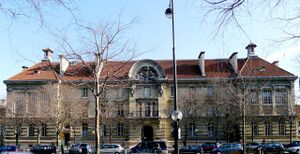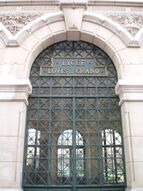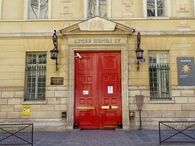Grande école
(Deep state milieu, Old-boys' network) | |
|---|---|
 ENSAM in Paris | |
| Membership | • Sciences Po • ÉNA • École Polytechnique • École normale supérieure • Mines ParisTech • HEC Paris • Saint-Cyr • ESDES • EDC Paris Business School • ESSEC Business School • École Nationale d'Administration |
| Fewer than 500 graduates of these elite schools dominate the highest echelons of business and politics, with an unaccountable and unsackable "old boys' network" "that makes the British government and business Britain appear a model of social diversity." | |
A grande école is a French institution of higher education that is separate from, but parallel and often connected to, the main framework of the French public university system. Grandes écoles are elite academic institutions, and a significant proportion of their graduates occupy the highest levels of French society[1][2][3]
Only 5% of students are admitted to a grande école. The domination even smaller at the top. Fewer than 500 graduates of elite schools dominate the highest echelons of business and politics, with an unaccountable and unsackable "old boys' network" "that makes the British government and business Britain appear a model of social diversity."[3]
Contents
Overview
The grandes écoles began post the French Revolution as centers of specialized education, based on merit, designed after the military academies of its times.
Most of these grandes écoles are about the size of a university department, and admit only a few hundred students each year. There are approximately 250 of them, throughout France, compared to less than 100 public Universités.[3] The intake of the grandes écoles lies at less than 5% of all students in higher education.
There are three broad fields of study followed in these elite institutes – Economics and Commerce, Literature, and Science.
Internships are a big part of the curriculum. For instance, at least 28 weeks are dedicated towards internships, at engineering schools, whereas graduates choosing a professional field at a university rarely intern for more than 20 to 25 weeks.
Many of the grandes écoles are public and therefore costs are limited. Private schools also exist and they have high tuition fees; business schools typically charge higher fees. However, the amount state spends on every student, at one of these elite Ecoles, is about four times higher than the 12,000 spent on a university student.[4]
Admission to grandes écoles

Every year 830,000 pupils start secondary school. Of those, 570,000 pass the baccalaureate, but only 280,000 take the "general" bac as opposed to the professional and technical alternatives considered inferior. Of these just 40,000 – around 5% – will get into classe préparatoire [preparatory classes], the "military-style boot camps" that provide intense grounding for the country's 200 elite grandes écoles, before taking a set of competitive national exams. Only 1,500 will be accepted at Science Po. Of the 260,000 who don't obtain any bac, the majority are from poor or modest backgrounds.
Admission to grandes écoles is different from that to French universities. The national exams are sets of written tests, given over the course of several weeks, that challenge the student on the intensive studies of the previous two years. During the summer, those students who succeed in the written exams then take a further set of exams, usually one-hour oral exams, during which they are given a problem to solve. After 20 minutes of preparation, the candidate presents the solution to a professor, who challenges the candidate on the answer and the assumptions being made. Afterwards, candidates receive a final national ranking, which determines admission to their grande écoles of choice.
"The idea is the brightest kids in the class can go on to run the country, but it doesn't work. Those in this elite come from much the same upper middle-class background and they are not running the country well," said author Peter Gumbel, who himself lectures at Sciences Po, one of the grandes écoles.[3]
Facts and figures
- The École Nationale d'Administration (ENA) and the École Polytechnique, the most elite of France's top schools, admit just 480 students a year – 0.057% of their age group and "a proportion so minuscule it could be a statistical error".[5]
- In 1980 an American study of managerial practices found 80% of the top executives of France's largest companies came from five grandes écoles.
- A study by Luc Rouban of CEVIPOF, Science Po's political research centre, found that Valéry Giscard d'Estaing, the 1970s president, had 61% of his entourage from Polytechnique and ENA; Nikolay Sarkozy, 55% of immediate staff; François Hollande is back to Giscard's levels.
- Only 12% of ENA students are from what could be described as working or lower-middle class families, according to the social trend monitoring agency, the Observatoire des Inégalités. And just 11% of Polytechnique students qualify for financial grants.
- ENA and Polytechnique take 480 admissions a year; Oxford and Cambridge take 3,400; US Ivy League universities (Harvard, Yale, Princeton, Columbia University, [[Dartmouth College[[, Cornell, Pennsylvania, Brown) take 24,000.
- Every year around 75 graduates of ENA and Polytechnique join the grands corps de l'État (grand state corps), for fast-track civil service careers and jobs for life. Britain's civil service fast-track scheme chose 390 candidates in 2011 (26% of whom were from Oxbridge).
- A 2003 European Central Bank report on the efficiency of the public sector in 23 countries ranked France 20th.
Examples
| Page name | Description |
|---|---|
| Sciences Po Aix | Recruitment university for the deep state and secret services |
| École Polytechnique |
Known members
8 of the 10 of the members already have pages here:
| Member | Description |
|---|---|
| ESSEC Business School | French prestigious business school |
| HEC Paris | |
| Mines ParisTech | |
| Saint-Cyr | The French Army's officer training establishment |
| Sciences Po | Many members of the French public service have studied at the institution. |
| École Normale Supérieure | |
| École Polytechnique | |
| École nationale d'administration |
References
- ↑ https://ghostarchive.org/archive/20220112/https://www.telegraph.co.uk/expat/4190728/Frances-educational-elite.html
- ↑ What are Grandes Ecoles Institutes in France?
- ↑ a b c d https://www.theguardian.com/world/2013/may/14/france-power-elitism-peter-gumbel
- ↑ https://www.mbacrystalball.com/blog/2019/04/19/grand-ecoles-france/
- ↑ https://www.theguardian.com/world/2013/may/14/france-power-elitism-peter-gumbel The fact and figures are from Peter Gumbel's book France's Got Talent: the Woeful Consequences of French Elitism,
Wikipedia is not affiliated with Wikispooks. Original page source here
